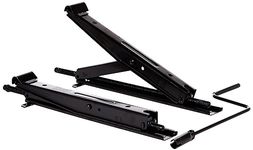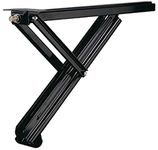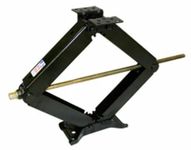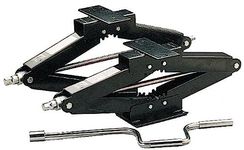10 bestRv Stabilizer Jacksof January 2026
112M consumers helped this year.
1
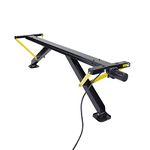
Lippert Components High-Speed Power Stabilizer Jack - No Switch Assembly (337199)
Lippert Components

9.9
2
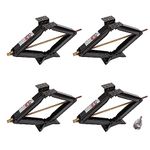
PEAKTOW PTJ0623 RV 4200 lb. 24" Stabilizer Scissor Jack W/Handle 4PK
PEAKTOW

9.8
3
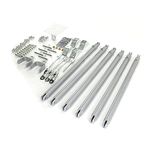
Lippert 191023 JT's Strong Arm Fifth-Wheel Jack Stabilizer Kit
Lippert Components

9.6
4
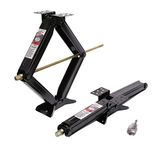
PEAKTOW PTJ0624 RV 4200lb. 24" Stabilizer Scissor Jack W/Socket 2PK
PEAKTOW

9.3
5
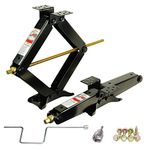
PEAKTOW J0603 7500 lb. 24" RV Stabilizer Scissor Jack W/Handle Socket Screws 2PK
PEAKTOW

9.1
OtherUp to 7% off
5% off
6
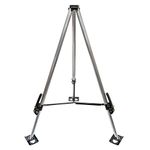
BAL R.V. Products Group 21100000 21100000 Tripod FASTJACK
ADNIK

8.8
7
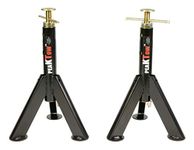
PEAKTOW PTJ0622 Telescopic Trailer RV Camper Stabilizer Jack 6000 Lbs Load Capacity 2PK
PEAKTOW

8.5
15% off
8
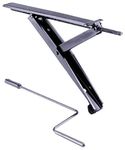
BAL 23026 148.1035 23026 20" Light Trailer Stabilizing Jack - 2 Piece
ADNIK

8.2
9
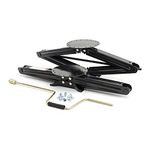
Lippert 285344 Scissor Jack Kit - 30", Pack of 2
Lippert Components

7.9
10
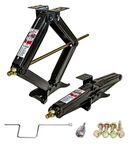
PEAKTOW J0602 5000 lb. 24" RV Stabilizer Scissor Jack W/Handle Socket Screws 2PK
PEAKTOW

7.6
A Guide to Selecting the Best Rv Stabilizer Jacks
Choosing the right RV stabilizer jacks is important for ensuring your recreational vehicle remains steady and comfortable when parked. Stabilizer jacks help prevent unwanted movement and swaying, making your RV experience safer and more enjoyable. When selecting stabilizer jacks, it's essential to consider your RV's size, weight, and how you plan to use your vehicle. Understanding the key specifications will help you make an informed decision that matches your needs and provides the best stability for your RV.
Weight Capacity
Weight capacity refers to the maximum amount of weight a stabilizer jack can support. This is crucial because using a jack with insufficient capacity can lead to instability or even damage. Weight capacities are usually listed per jack, so you need to consider the total weight your RV will place on each jack. Lighter jacks (supporting up to 2,000 lbs) are suitable for small trailers or pop-ups, while medium (2,000–5,000 lbs) and heavy-duty jacks (over 5,000 lbs) are better for larger travel trailers and motorhomes. To pick the right one, check your RV’s weight and ensure the jacks you choose can comfortably support it, factoring in a safety margin.
Jack Type
There are several types of stabilizer jacks, including scissor jacks, electric jacks, hydraulic jacks, and tripod jacks. Scissor jacks are manual and commonly used for their simplicity and affordability. Electric and hydraulic jacks offer easier operation with the push of a button, making them ideal for those who want convenience or have mobility concerns. Tripod jacks are often used for fifth-wheel trailers to stabilize the front. Your choice should depend on how much effort you want to put into setup and the type of RV you have.
Lift Range
Lift range is the distance a jack can extend and retract, which determines how much height adjustment you have. This is important because your RV may be parked on uneven ground, and you need enough range to stabilize it properly. Shorter lift ranges (up to 18 inches) are fine for low-profile trailers, while higher lift ranges (18–30 inches or more) are necessary for taller RVs or when camping on rough terrain. Consider your RV’s ground clearance and typical camping spots to choose a lift range that will work in all situations you expect to encounter.
Material and Build Quality
The material and build quality of stabilizer jacks affect their durability and resistance to weather. Most jacks are made from steel, which is strong but can rust if not coated properly, while some use aluminum for lighter weight and corrosion resistance. Look for jacks with rust-resistant coatings or treatments if you plan to camp in wet or coastal areas. If you want long-lasting jacks that can handle frequent use and exposure to the elements, prioritize sturdy construction and protective finishes.
Ease of Installation and Use
How easy it is to install and operate the jacks can make a big difference in your camping experience. Some jacks are bolt-on and require tools for installation, while others are portable and can be set up quickly. Manual jacks require physical effort, while electric or hydraulic options are more user-friendly. If you prefer quick setup or have physical limitations, look for jacks that are easy to deploy and adjust. Consider how often you’ll be setting up and breaking down your RV to decide what level of convenience you need.
Best Reviews Guide Newsletter
Get exclusive articles, recommendations, shopping tips, and sales alerts
Sign up for our newsletter to receive weekly recommendations about seasonal and trendy products
Thank you for subscribing!
By submitting your email address you agree to our Terms and Conditions and Privacy Policy
